- Bernard Preston homepage
- Bread
- Why Is Whole Grain Better
Why is whole grain better?
Why is whole grain better is a remarkably complex and even controversial subject; it affects many systems in the body from spiking blood-glucose to the beneficial metabolites like serotonin synthesised by the microbiome in the colon.
The gluten controversy must be squarely-faced too.
So must the "big fat lie" be weighed. Millers may call their products "wholegrain" provided they do not extract more than 40% of the goodies.
100% true whole grain is extremely difficult to find. The big fat lie deceives us all. For this reason we decided to purchase our own small stone mill; one of the best decisions we ever made.
There is a massive body of research now revealing how refined grains contribute to obesity, type 2 diabetes and heart conditions; the so-called chronic degenerative diseases.
But true whole grains are another whole story; they are like chalk and cheese.
New work has also clearly shown that refined grains play a major role in causing dry age-related macular degeneration, the chief reason for blindness in persons over fifty. This subject is not "small beer."
Every slice of chocolate cake is a step on the downward spiral to a life needlessly cut short; and cans of sugary energy drinks too.
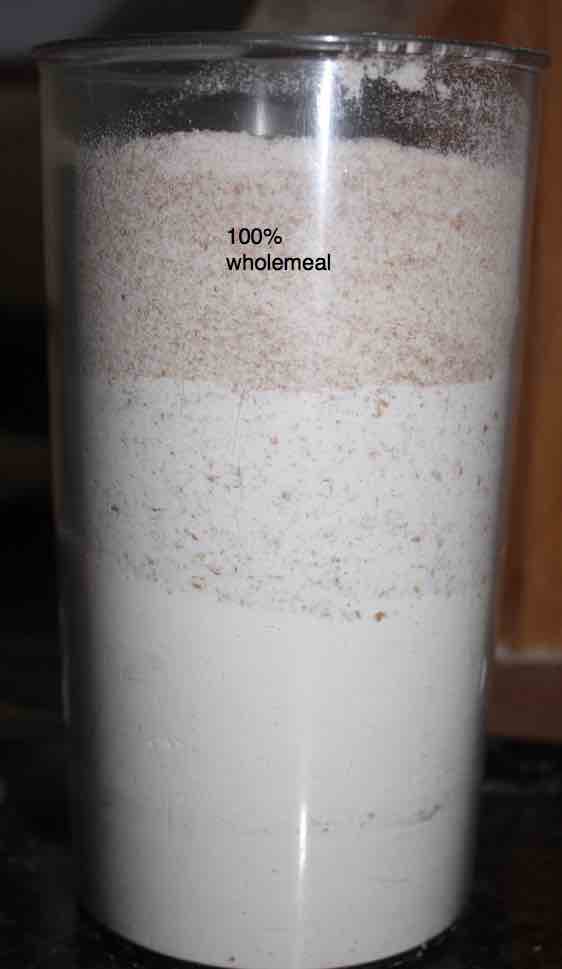 True 100% grain at the top, so-called "wholemeal" and cake flour.
True 100% grain at the top, so-called "wholemeal" and cake flour.Over five million Americans are needlessly blind and many more partially-sighted; cake flour is in part the guilty carb. Food low in two phytonutrients called lutein and zeaxanthin is also a contributor[5].
How to test for prediabetes in the home-setting is easily done if you know someone with a glucometer. I do recommend using a continuous glucose monitor for a month though; that will reveal all.
In theory "whole grain" should mean the flour contains the bran, germ and endosperm in the exact same proportions as found in the original kernel. In practice it hardly exists because the oils are rapidly oxidised once the shell is cracked; and the public is not fond of coarse bread. So what is to be done?
This page was last updated on 9th October, 2024.
Obesity
Whole grains are better because they help decrease weight and body mass index.[1] There are numerous reasons for this.
Firstly whole grains promote satiety, meaning we are less likely to feel the need to snack, usually on refined-carbs. Stomach contents are released more gradually, slowing the unlocking of glucose from the starch for absorption in the small intestine; and thus into the blood stream.
Secondly more calories are excreted in the faeces of those on a high-fibre diet.
And thirdly we also benefit from an increased resting metabolic rate; those eating whole grains consume more calories when not active than those enjoying the refined flour used for making commercial bread, cookies and most breakfast cereals.
And fourthly whole grains are better because they contain what is known as resistant starch; the molecules are configured in a way that enzymes in the gut take longer to digest them. There is no immediate flood of glucose into the portal blood system.
Put bluntly those who eat whole grains are less fat; or those who enjoy mainly refined carbohydrates are far more likely to be obese.
"The calories in corn flakes, white-bread and refined rice are 100% glucose; and potatoes from cold storage too."
- Dr Dariush Mozaffarian, MD, PhD
New potatoes are the exception, by the way; if you can get them. That is why we grow them and never buy spuds from cold-storage.
Restriction of calories has proved largely unsuccessful in promoting weight-loss; simply changing to whole grains and oddly adding the good fats to our food has proved far more effective. It is all about constantly feeling hungry when dieting.
- What is starch in food? Why cooling your carbs overnight and enjoying them the next day is so important; it's all about retrogradation.
Diabetes
Type 2 diabetes mellitus (T2DM) is the most common metabolic disease worldwide. Currently there are over 400 million cases, and the prevalence is predicted to increase by 50 percent by 2040[2].
Lifestyle interventions include a change to whole grains and daily exercise, particularly immediately after a starchy meal; presently the best initial strategies to prevent and treat T2DM.
Strictly excluding all refined carbohydrate as is done in the various ketogenic diets is the next step. And for those who are unstable diabetics, restricting starch to less than 50g per day, even the good ones.
Do you understand what is meant by "net carbs?"
Heart disease
The raised blood glucose of diabetes results in profound inflammation of the capillaries and larger vessels; and consequently cardiovascular disease. Then that is followed by hypertension and insulin-resistance. Together these are known as metabolic syndrome.
It is no coincidence that cardiovascular disease is the number one cause of death. Simply replacing a refined starch with a whole grain is the simplest effective strategy to change all of this.
Actually there is nothing simple about it; it means foregoing all commercial bread, or baking your own. True whole grains are difficult to find.
Mental health
Lithium belongs to a group of elements known as the alkali-metals; along with sodium and potassium. They are profoundly important in the body.
Lithium has long been successfully used in the treatment of bipolar-disorder. And there is strong research that where the element is more readily available from our food and water there are much lower levels of suicide and in general violent behaviour[4].
Lo and behold, whole grains are second only to nuts when it comes to foods rich in lithium. Potatoes, tomatoes and cabbage are listed as other good sources.
Foodstuff
Nuts
Whole grain cereals
Vegetables
Mcg/g dry weight
8.8
4.4
2.3
It is estimated that an average person requires about 1000 mcg of lithium per day; those not enjoying nuts, true whole grains and vegetables on a daily basis are more likely to behave peculiarly.
Lithium has a vitally important role to play in normalising nerve transmission in the brain and spinal-cord; both activation and inhibition of certain neurotransmitters.
A deficiency actually leads to a decrease in the density of the gray matter and the size of two important nuclei in the brain.
It is involved in vitamin transport of folate and B12 and modulates the immune-system, for example during the storm caused by the coronavirus. It is an antioxidant. As always, let your food be your medicine; a small continuous supply from nutritious meals and spring water is best.
Refined bread flour
Regrettably since the oils in 100% flour go rancid after milling, virtually all bread is made from grains that have been refined to one degree or another.
There is a big fat lie in legislation worldwide regarding bread; bakers are allowed to call it "whole-grain" provided that not more than 40% of the goodies have been removed, notably the fibre and germ.
Supermarket bread is thus a major cause of obesity, diabetes and cardiovascular disease; and mental illness too.
If you love bread and value your health there is only one solution. Mill your own flour and make a loaf, unless you can find a bakery that does that; there are extremely few.
It's all about real and fake bread. The one is wholesome and satiating; the other tasteless, fattening and may give you a bellyache. Does that answer for you the question why is whole grain better?
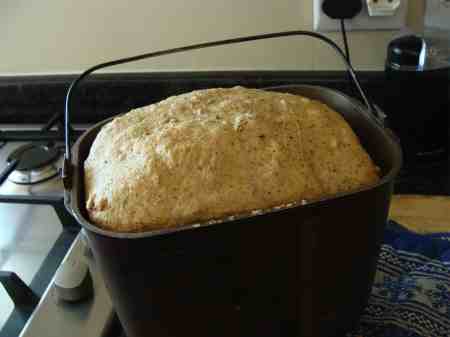
It takes but five minutes to mix the ingredients for low GI bread, including milling the wheat.
Once you step up to 100 percent real flour for your baking, you'll never look back.
"Science is a way of trying not to fool yourself."
- Richard Feynman, theoretical physicist[7]
Constipation
The fibre in whole grains goes a long way to alleviating constipation, though in many cases it is not enough. Those with a lazy colon need something more.
It may have to do with insufficient norepinephrine to stimulate motility of the gut; it is formed from another neurotransmitter called dopamine.
Over and above the fibre making whole grains better, I personally must have soluble fibre too on a daily basis; that means fruit and greens at least twice a day. Then I have no difficulty whatsoever. The malignant colorectal-tumours associated with constipation are horrific; and the prevalence is rising by around 2% every year, especially in those under 55.
It is no coincidence that having suffered from chronic constipation since childhood that I have now developed a tremor in my right hand; it's one of the risk factors. Dopamine should also be produced by the cells lining the colon.
Eyesight
Researchers working at the Tufts' Friedman School of Nutrition state that there is strong data showing that those who consume high GI foods are at a higher risk of contracting age-related macular degeneration, the chief cause of blindness in older folk. They cause dysfunction of the rods and cones in the retina and loss of photoreceptor cells.
It's all about the rapid digestion and assimilation of the starches in refined grains.
They investigated the effect of high GI food from refined starches as compared to a low glycemic diet using whole-grains but with the same number of total calories[3].
"The first principle is that you must not fool yourself,
and you are the easiest person to fool."
- Richard Feynman
There were clear signs that those mice on a whole grain diet had far less loss of pigmentation and atrophy of the retinal cells; or the accumulation of toxic fat caused by "glycation." That's the bonding of a sugar-molecule onto a lipid or protein molecule in the eye.
These advanced glycation end-products are implicated in many diseases including macular degeneration, with consequent loss of sight.
Why are whole grains better?
They attributed this to the types of bacteria found in the gut. Those on a high glycemic diet had many pathogens of the Clostridiales order in the colon but those on whole grains gained protection from the friendly Bacteroidales bugs; they release certain eye-protective metabolites including serotonin.
Interestingly changing the diet half-way through the research to a third group of mice arrested and even to a degree reversed the macular degeneration.
2015 dietary guidelines
The 2015 dietary guidelines for Americans recommend replacing some refined-starches with true whole grains until they make up no more than 50% of our food.
Whilst that may be suitable as an achievable first-step, we believe it does not go nearly far enough. We personally eat virtually no refined grains and give that much of the credit for the fact that in our eighth-decade we take absolutely no chronic medication.
We would take drugs for an infectious illness such as pneumonia obviously but in fact have had no need for any pills for several years.
A recent consultation with an optician confirmed good pigmentation of the retina, no signs of macular degeneration or cataracts either; that's another proven benefit that whole grains are better.
Why is whole grain better?
"40% of Americans eat no whole-grains at all; and only 8 percent consume the recommended three helpings per day."
Gluten intolerance
There are concerns in nutritional circles that the fad, if I may call it that about gluten intolerance has meant that a great many people have moved away from whole-grains to their overall detriment.
This is not to say that gluten-intolerance does not exist, it certainly does but to attribute every grumble in the intestine to an allergy from wheat is sheer nonsense. Stepping up to artisan bread is the solution for the majority; sourdough.
Learning how to make kefir is what sorted out my own personal grumbles; and in just one week. Regular enjoyment of probiotic foods is supremely important; even if you don't like them.
The first step when treating the unhappy tum is to increase the fibre in the diet; both insoluble as in whole-grains and also that from fruits and vegetables.
The second step is ensure a happy microbiome in the intestine by enjoying fermented-foods on a regular basis; even daily. Homemade sauerkraut would be one example.
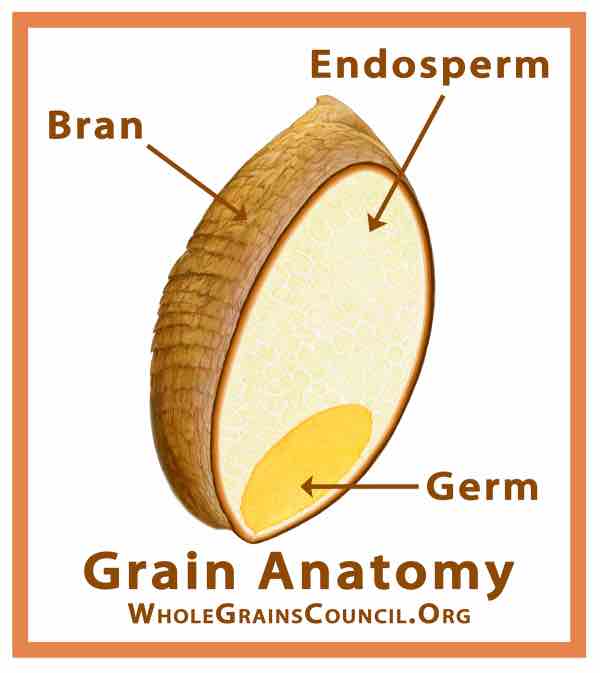
- The starch is contained in the endosperm.
- The germ contains the protein, nutritious fatty-acids and vitamin E.
- The bran is where the fibre, several B-vitamins and minerals like calcium are found; and some of the protein.
In the refining of flour most of the best parts, the germ and bran, are removed.
You may be thinking, why do the millers removed the minerals and vitamins and then have to "enrich" the flour again? We started this page by saying that the fatty-acids start to go rancid once the grain is cracked and oxygen starts to do its work.
It is best to grind the wheat and immediately bake your bread; fermentation with sourdough is profoundly beneficial, especially for those who are gluten intolerant.
Are you now more able to answer the question why is whole grain better?
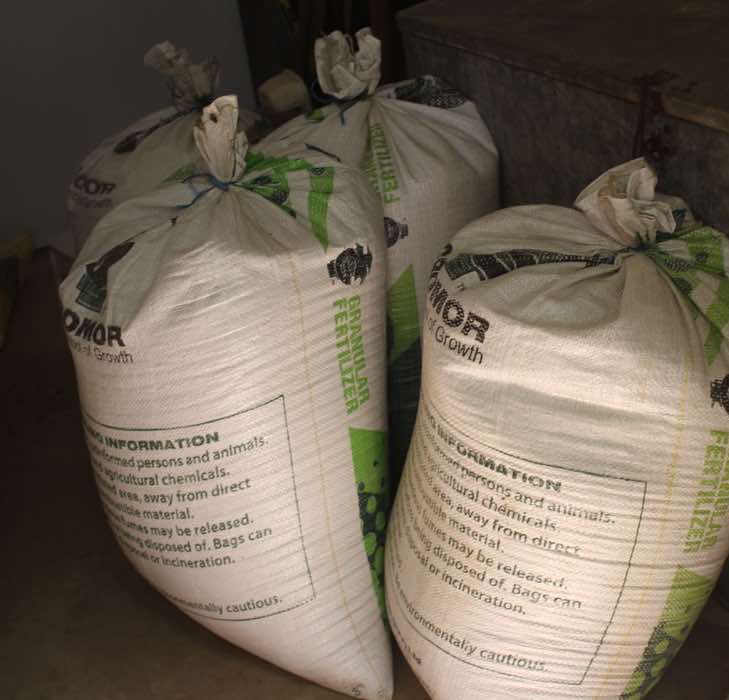
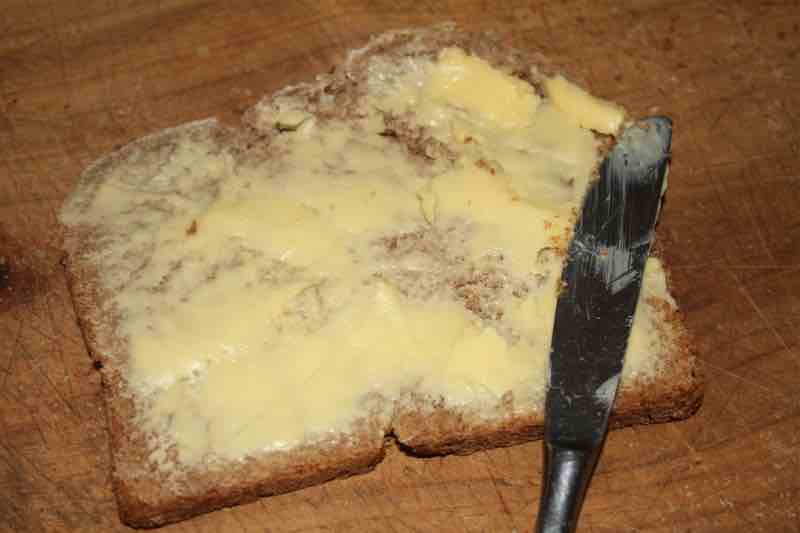
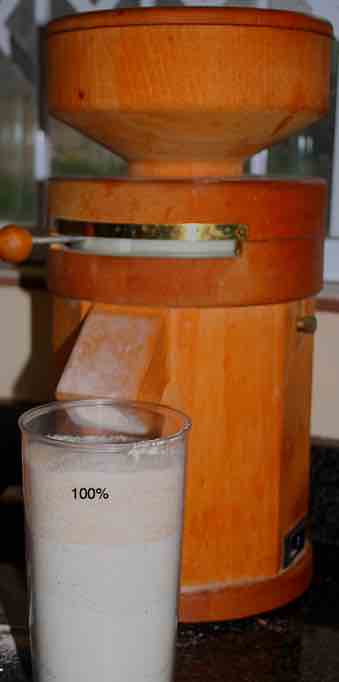
A reasonable compromise is to keep it in an airtight container in the fridge for up to a week, or the deep-freezer for a month. Storing wheat safely from moisture, air and weevils requires that it is frozen for two weeks.
Why is whole grain better? Because the taste is far superior and it solves a multitude of wellness-issues.
Now you can see why 100 percent real flour is better; but admit it frankly that stepping up to greater wellness will take time and commitment.
It has been one big step for us as we try to create what we are calling a Cyan Zone at our home; blue issues for greater wellness and green for the health of the planet.
Our green journey has been one of the most rewarding facets of our lives; simply being freed largely from pain, doctors and pills has made it so worthwhile.
"Refined grains are worse than trans oils; which cause more damage than saturated fat.
Poly and monounsaturated are least damaging to the heart."
- PURE trial
Which are worst of the lot? Refined grains, perhaps surprisingly top the pops.
Multi-grain
Beware of terms like "multigrain" on the packaging of bread-products which just means there are several different ones; for example oats, wheat and rye but they are usually highly refined.
Whole grains have far more flavour; once your tongue gets used to the fact that you have to chew more, you will never go back. Simply having an easier time on the loo will convince you; add some soluble-fibre foods like spinach and apples to your meals also. Then it becomes a two-minute affair.
Trust me I'm a doctor; I have had a life-long journey with severe constipation since childhood. Thankfully the problem is now solved. I think you may be beginning to understand why I am passionate about the question of why whole grain is better.
Few things will improve your wellness more than learning to distinguish between real and fake bread.
Step up to better health
- Start replacing some of the cake-flour with whole grain products.
- Absolutely avoid doughnuts, white bread-rolls and buns.
- Keep cakes and cookies for high and holy-days.
- Choose only breakfast cereals that have at least 2g of fibre for every 10g of starch. Especially avoid cornflakes and other highly refined and sugared products. Rolled and steel-cut oats with a teaspoon of raw honey and cream make an excellent meal.
- Start weighing whether you should be investing in a wheat-mill and electric bread oven; it takes only five minutes to mix the dough and there will be a massive saving on your medical bills. To boot you get the best tasting loaf in the world.
Why is whole grain better?
Why is whole grain better is an important question because of the assumption in many quarters that gluten is the cause of every grumble in the intestine.
Potassium
True 100pc wholewheat has 2mg of sodium and 431 of potassium[8]; this is vastly important for blood pressure.
- Whole-grain cereal in prevention of obesity
- Wholegrain Intake and Risk of Type-2 Diabetes: Evidence from Epidemiological and Intervention Studies
- Involvement of a gut-retina axis in protection against dietary glycemia induced age related macular degeneration
- Is Lithium a Micronutrient? From Biological Activity and Epidemiological Observation to Food-Fortification
- Lutein macular-degeneration
- Whole grain consumption and malignant breast tumours
- Dr Mardy's quotes
- Wheat Health Benefits and Its Side Effects
When browsing use right click and Open Link in New Tab, or you may get a bad gateway signal.
Newsletter
Our newsletter is entitled "create a cyan zone" at your home, preserving both yourself and Mother Earth for future generations; and the family too, of course. We promise not to spam you with daily emails promoting various products. You may get an occasional nudge to buy one of my books.
Here are the back issues.
- Lifestyle and ideal body weight
- What are ultra-processed foods?
- Investing in long-term health
- Diseases from plastic exposure
- Intensive lifestyle management for obesity has limited value
- A world largely devoid of Parkinson's Disease
- The impact of friendly bacteria in the tum on the prevention of cancer
- There's a hole in the bucket
- Everyone is talking about weight loss drugs
- Pull the sweet tooth
- If you suffer from heartburn plant a susu
- Refined maize meal and stunting
- Should agriculture and industry get priority for water and electricity?
- Nature is calling
- Mill your own flour
- Bake your own sourdough bread
- Microplastics from our water
- Alternative types of water storage
- Wear your clothes out
- Comfort foods
- Create a bee-friendly environment
- Go to bed slightly hungry
- Keep bees
- Blue zone folk are religious
- Reduce plastic waste
- Family is important
- What can go in compost?
- Grow broad beans for longevity
- Harvest and store sunshine
- Blue zone exercise
- Harvest and store your rainwater
- Create a cyan zone at your home
Did you find this page interesting? How about forwarding it to a friendly book or food junkie? Better still, a social media tick would help.
- Bernard Preston homepage
- Bread
- Why Is Whole Grain Better
Address:
56 Groenekloof Rd,
Hilton, KZN
South Africa
Website:
https://www.bernard-preston.com